Brands need to play the refresh game with caution
Try to get too clever with the messaging and it can boomerang

New York
In June, Planters’ iconic Mr. Peanut popped up on social media to peddle a canister of Cheez Balls.
“How much would you give to try my Cheez Balls? No. Really. There’s a canister up on eBay,” read a mischievous tweet from the account of the top-hatted Mr. Peanut.
The crispy snack was a favourite among some in the 1980s and ‘90s before being discontinued about 12 years ago, and the tweet caused some commotion online. The canister wound up selling for more than $2,000 (Dh7,346).
“We got almost 1.5 billion impressions,” said Eduardo Luz, president of the US grocery business at Kraft Heinz, which owns Planters Cheez Balls. “It’s a marketer’s dream.”
Ten days after the canister’s sale, the company announced that Cheez Balls would return for a limited time.
Planters is among a growing number of brands reintroducing products for new generations. “What’s old is new again,” said Robert Passikoff, president of Brand Keys, a research company. “Brands are trying not to be static.”
Naysayers contend that younger generations may be sceptical and quick to dismiss products that they identify with their parents or grandparents as outdated and boring. But others disagree.
“They do not see it as nostalgia, but rather as legacy and a new experience,” according to a report by NPD Group, a market research firm.
But legacy brands still need to connect. Younger people want brands with a conscience — whether the companies take a stand on social issues like the environment and the #MeToo movement, or use ingredients that are environmentally friendly.
“This is a generation that really values a brand that has values,” said Brad Fay, chief commercial officer at Engagement Labs, a company that analyses conversations about brands.
The dishwashing liquid Dawn, created by Procter & Gamble in 1972, has paid attention. While many big-brand dish soaps have lost customers over the past decade to new environmentally friendly alternatives, like Jessica Alba’s Honest brand and Seventh Generation, Dawn has flourished. One marketing move: Dawn teamed up with International Bird Rescue to market its brand as the company that cares about wildlife and the environment.
Its slogan — “Tough on grease, yet gentle on feathers” — struck a chord.
Dawn’s latest “Lean on Me” campaign celebrates 40 years of the company’s wildlife activism. Ducklings dominate its ads and webpage, while the song “Lean on Me” plays. The ads showcase how Dawn has helped rescue, clean and release more than 75,000 birds and marine mammals back into the wild.
“It’s brilliant, just brilliant,” said Paul Friederichsen, a partner at the Blake Project, a brand marketing and consulting firm. “The emotional content is outstanding. It creates an incredible image for the product.”
Authenticity certainly helps. “There are so many examples of corporations supporting nonprofits and the relationship doesn’t go much further than the marketing,” said JD Bergeron, executive director of International Bird Rescue. But that is not the case with Dawn, he said, adding, “We literally use the soap every single day, and it is our product of choice.”
SunnyD, formerly Sunny Delight, had waned in popularity since its heyday in the ‘80s and ‘90s. When Brynwood Partners acquired the brand in 2016 and merged it into its Heritage Hill Beverage unit, it saw opportunity.
It started a marketing campaign in August aimed at transforming its image through new packaging, an updated logo and high-energy video ads on social media, in movie theatres and on television. The ads feature teenagers with unique talents — including a bike acrobat and a tech whiz — all holding bottles of SunnyD while the commercial’s hip-hop jingle plays.
“We know that today’s youth are very much into individualism and embracing the unique qualities of their peers,” said Jim Gerbo, vice-president of marketing at Sunny Delight Beverages. “And we think that SunnyD has a one-of-a-kind taste.”
But not every refresh has worked.
When Kellogg’s Special K started a campaign to appeal to younger women last year, its ad showed women engaged in energetic activities, along with an affirmation: “We eat”. Some found it condescending and patronising to portray “eating” as some feat that women had accomplished. Others found it confusing since everybody eats.
Special K wound up pulling the ads and changing the slogan to “we fuel ourselves”. “We listened and responded to reactions in real-time,” said Christie Crouch, director of Special K Brand Marketing.
Then there was IHOP, which faced a backlash on social media when it said it was changing its name to IHOB, after adding a new line of burgers to its menu. Later it claimed the name change was a joke, leaving some customers feeling duped.
IHOP may have gotten “millions of dollars in unpaid media exposure,” Friederichsen of the Blake Project said. “But I think long term, they’ve done damage to their brand.”
It is critical that brands refresh and reach out to new generations. Their future depends on it.
“It’s essential,” Perlut of Elasticity said. “As audiences age, they die, and you need to continually refresh your consumer base. And if you’re not doing that, your product ends up being just a footnote in history.”
— New York Times News Service
Sign up for the Daily Briefing
Get the latest news and updates straight to your inbox
Network Links
GN StoreDownload our app
© Al Nisr Publishing LLC 2026. All rights reserved.